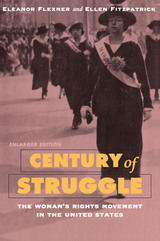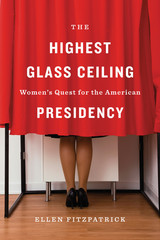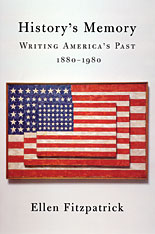
Century of Struggle tells the story of one of the great social movements in American history. The struggle for women’s voting rights was one of the longest, most successful, and in some respects most radical challenges ever posed to the American system of electoral politics.
“The book you are about to read tells the story of one of the great social movements in American history. The struggle for women’s voting rights was one of the longest, most successful, and in some respects most radical challenges ever posed to the American system of electoral politics… It is difficult to imagine now a time when women were largely removed by custom, practice, and law from the formal political rights and responsibilities that supported and sustained the nation’s young democracy… For sheer drama the suffrage movement has few equals in modern American political history.”—From the Preface by Ellen Fitzpatrick

In The Highest Glass Ceiling, best-selling historian Ellen Fitzpatrick tells the story of three remarkable women who set their sights on the American presidency. Victoria Woodhull (1872), Margaret Chase Smith (1964), and Shirley Chisholm (1972) each challenged persistent barriers confronted by women presidential candidates. Their quest illuminates today’s political landscape, showing that Hillary Clinton’s 2016 campaign belongs to a much longer, arduous, and dramatic journey.
The tale begins during Reconstruction when the radical Woodhull became the first woman to seek the presidency. Although women could not yet vote, Woodhull boldly staked her claim to the White House, believing she might thereby advance women’s equality. Republican Senator Margaret Chase Smith came into political office through the “widow’s mandate.” Among the most admired women in public life when she launched her 1964 campaign, she soon confronted prejudice that she was too old (at 66) and too female to be a creditable presidential candidate. She nonetheless became the first woman to have her name placed in nomination for President by a major party. Democratic Congresswoman Shirley Chisholm ignored what some openly described as the twin disqualifications of race and gender in her spirited 1972 presidential campaign. She ran all the way to the Democratic convention, inspiring diverse followers and angering opponents, including members of the Nixon administration who sought to derail her candidacy.
As The Highest Glass Ceiling reveals, women’s pursuit of the Oval Office, then and now, has involved myriad forms of influence, opposition, and intrigue.

Enthusiasts and critics both have looked to the political upheavals of the 1960s to explain recent transformations in historical study. But how new, in fact, are our contemporary approaches to the study and writing of American history? This question lies at the heart of History's Memory, Ellen Fitzpatrick's sweeping study of the past century of American historical writing.
Through careful examination of hundreds of historical essays and books, Fitzpatrick has uncovered striking continuities in the writing of American history. The contributions of earlier scholars, some of them outside the mainstream of the historical profession, reveal that interest in the history of women, African Americans, Native Americans, and the working class has been long-standing. Whether in the Progressive era's attention to issues of class, or in the renewed concern with Native Americans in the 1930s and 1940s, Fitzpatrick demonstrates that over the past century historians have frequently grappled with issues that we think of today as innovative.
This reinterpretation of a century of American historical writing challenges the notion that the politics of the recent past alone explains the politics of history. Fitzpatrick offers a wise historical perspective on today's heated debates, and reclaims the long line of historians who tilled the rich and diverse soil of our past.
READERS
Browse our collection.
PUBLISHERS
See BiblioVault's publisher services.
STUDENT SERVICES
Files for college accessibility offices.
UChicago Accessibility Resources
home | accessibility | search | about | contact us
BiblioVault ® 2001 - 2024
The University of Chicago Press









